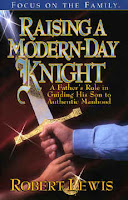Raising A Modern Day Knight
 A group of fathers of boys and I have been reading (well, we finished it) Raising A Modern Day Knight by Robert Lewis.
A group of fathers of boys and I have been reading (well, we finished it) Raising A Modern Day Knight by Robert Lewis.
It's a book that talks about Biblical manhood and compares it to stages, training and rites of passage that medieval knights once went through to have a definative mark of the stages of life and when they enter manhood.
Today, we took our boys bowling, but unbeknownst to them, we had reserved a room and had decorated it for the occasion. This day would mark their entrance into the process of Biblical manhood by having the process explained to them capping it all off with signed proclamations .
Rather than retype the main gist of the book, here is a quote from an article at Ledership Universtity
Robert Lewis suggests three major ideals for modern-day knights: a vision for manhood, a code of conduct, and a transcendent cause.
A Vision for Manhood - The author states four manhood principles: Real men (1) reject passivity, (2) accept responsibility, (3) lead
courageously, and (4) expect the greater reward. He suggests that though men have a natural inborn aggressiveness, they tend to become passive at home and avoid social responsibility. These principles, if followed, prevent passivity from becoming a significant problem.
A Code of Conduct - The code for modern-day knights comes from the pages of the Bible. Lewis lists 10 ideal characteristics appropriate for modern-day knights taken from the Scriptures: loyalty, kindness, humility, purity, servant- leadership, honesty, self-discipline, excellence, integrity, and perseverance. Modern-day knights must be trained in three important areas. First, the modern-day knight needs to understand that there must be a will to obey (God's will) if there is to be spiritual maturity. The young man must come to know that life is inherently moral and that there is a God who knows everything and who rewards good and punishes evil.
He must know that absolute values exist and that the commandments of God are liberating, not confining. Lewis states "True satisfaction in life is directly proportionate to one's obedience to God. In this context, moral boundaries take on a whole new perspective: they become benefits, not burdens."
Second, the modern-day knight needs to understand that he has a work to do that is in keeping with his inner design. This work is not just his profession or trade, but refers to work in his home, church, and community. Life is certainly more than a job, and your son should hear this from you lest he get the mistaken perception that manhood is just one duty and obligation after another.
A third realm of responsibility for the modern-day knight is a woman to love. The code of chivalry requires that all women be treated with respect and honor. Sons need to see and hear from their fathers the importance of caring for women in general and loving, leading, and honoring their wives in particular.
The knight in training should be taught the value of work, have summer jobs, do chores around the house, and study hard on his school work. The goal here is to establish patterns of industry and avoid sloth so that a solid work ethic is in place as he gets older.
A Transcendent Cause - Life is ultimately unsatisfying if it is lived solely for self. Jesus said if you give up your life you will find it, so if you live for a cause greater than yourself, you'll be happy and fulfilled. A transcendent cause is a cause that a person believes is truly heroic (a noble endeavor calling for bravery and sacrifice), timeless (has significance beyond the moment), and is supremely meaningful (not futile).
The only antidote to the futility of life is a transcendent cause and a vision for life that "integrates the end of life with the beginning," and connects time and eternity. Obviously becoming a Christian, developing a personal relationship with Christ, and living for Him are basic, irreplaceable elements for having a meaningful life.









